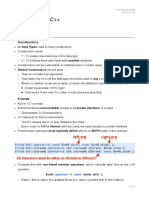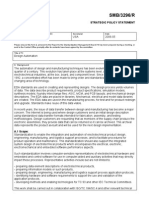0 ratings0% found this document useful (0 votes)
80 viewsCPP 4
The document discusses enumerated constants and enumerated types in C++. It introduces enumerated constants as a way to assign codes or values to a set of items. It then discusses enumerated types which declare a type whose values can only be those enumerated. Enumerated types avoid errors from assigning invalid values. The document also covers using enumerated types with constructors, arrays of pointers, dynamic memory allocation, destructors, and virtual destructors.
Uploaded by
api-3697260Copyright
© Attribution Non-Commercial (BY-NC)
We take content rights seriously. If you suspect this is your content, claim it here.
Available Formats
Download as PDF, TXT or read online on Scribd
0 ratings0% found this document useful (0 votes)
80 viewsCPP 4
The document discusses enumerated constants and enumerated types in C++. It introduces enumerated constants as a way to assign codes or values to a set of items. It then discusses enumerated types which declare a type whose values can only be those enumerated. Enumerated types avoid errors from assigning invalid values. The document also covers using enumerated types with constructors, arrays of pointers, dynamic memory allocation, destructors, and virtual destructors.
Uploaded by
api-3697260Copyright
© Attribution Non-Commercial (BY-NC)
We take content rights seriously. If you suspect this is your content, claim it here.
Available Formats
Download as PDF, TXT or read online on Scribd
You are on page 1/ 2
Enumerated constants
• Can we make “codes” for a set of items?
const int box_code = 0;
Intro to C++ part 4 const int tank_code = 1;
const int flat_code = 2;
Marge Coahran
Some material from: • Even easier:
Winstohn, P.H., “On to C++” enum {box_code, tank_code, flat_code};
ISBN: 0-201-58043-8
enum {ftp = 21, ssh = 23, http = 80 };
Using enumerated constants Enumerated types
int type_code; • declare an enumerated type:
… enum car_code {box_code, tank_code, flat_code};
switch (type_code) {
case box_code: train[i] = new BoxCar; break;
case tank_code: train[i] = new TankCar; break; • declare a variable of that type:
case flat_code: train[i] = new FlatCar; break; enum car_code type_code;
default: cerr << “Invalid type code ” <<
type_code << endl;
}; • now we can only assign valid types:
type_code = box_code;
• Can we avoid this error? type_code = 0; /* ERROR */
More Constructors More Constructors (II)
class TankCar { class Plant {
public: public:
//constructor with default parameters values enum color_code {green, red, white};
TankCar(int h = 10, int w = 5, int l = 10) {
height = h, width = w, length = l}; Plant(color_code c = green);
private: …
double height, width, length; };
};
class Raspberry : public Plant {
main() { public:
TankCar x; //constructor that calls its parent’s constructor
TankCar x(12, 7,12); Raspberry() : Plant(red) {…};
TankCar x(12); …
}
}
Freeing dynamic memory Freeing dynamic memory (II)
• Recall -- allocating dynamic memory: • To delete (free) objects pointed to by an array of
Plant* p1 = new Plant; pointers:
Plant* p2 = new Plant[100];
main() {
• To delete (free) a single object pointed to by p1: Plant* forest[100];
delete p1; forest[0] = new Plant;
forest[1] = new Plant;
• To delete (free) an array pointed to by p2: …
delete [ ] p2;
for (int i=0; i<100; i++)
• “Different implementations will react differently to delete forest[i];
incorrect uses of delete and delete [].” (Stroustrup, 1997) }
Dynamic memory in class objects Destructors
• When an object goes out of scope, its local memory is • The class destructor runs when an object goes out of
reclaimed. But what about dynamic memory? scope. Free dynamically allocated memory there.
class BoxCar : public RailCar { class BoxCar :public RailCar {
Public: Public:
BoxCar(char* snum); BoxCar(char* snum);
Private: ~BoxCar(); //destructor (only one!)
char* serial_num; Private:
}; char* serial_num;
BoxCar::BoxCar(char * snum) { };
//dynamically allocate space for serial number BoxCar::~BoxCar() {
serial_num = new char[strlen(snum)+1]; // free dynamically allocated memory
strcpy(serial_num, snum); delete [ ] serial_num;
} };
Destructors (II) Virtual Destructors
• When a dynamically allocated object is deleted • If a base class has any virtual functions, it should also
(freed), its destructor automatically runs. have a virtual destructor (even if empty) to ensure the
subclass destructor runs in this case.
main() { class RailCar {
RailCar* ptr = new BoxCar(“46520”); Public:
RailCar ();
delete ptr;
virtual ~RailCar () { }; //virtual destructor
}
…
Private:
• But which destructor runs: ~BoxCar() or …
~RailCar()? };
You might also like
- Device Properties Manual For Programming Cards - DPD00705V004100% (1)Device Properties Manual For Programming Cards - DPD00705V00434 pages
- Constructors & Destructors: Controlling Initialization & DestructionNo ratings yetConstructors & Destructors: Controlling Initialization & Destruction18 pages
- Act 2 Arrays Pointers and Dynamic Memory AllocationNo ratings yetAct 2 Arrays Pointers and Dynamic Memory Allocation8 pages
- Tokens, Expressions and Control StructuresNo ratings yetTokens, Expressions and Control Structures21 pages
- Object Oriented Programming Using C++ CST-157 Unit-Iii Pointers and Virtual Functions Chapter-7No ratings yetObject Oriented Programming Using C++ CST-157 Unit-Iii Pointers and Virtual Functions Chapter-717 pages
- C++ Interview Questions And Answers For ExperiencedNo ratings yetC++ Interview Questions And Answers For Experienced14 pages
- C++ Interview Questions and Answers For Freshers PDF100% (1)C++ Interview Questions and Answers For Freshers PDF5 pages
- Ch10 Data Abstraction and Object Orientation 4eNo ratings yetCh10 Data Abstraction and Object Orientation 4e39 pages
- CMSC 202: Pointers Dynamic Memory AllocationNo ratings yetCMSC 202: Pointers Dynamic Memory Allocation36 pages
- 9 Data Abstraction and Object OrientationNo ratings yet9 Data Abstraction and Object Orientation36 pages
- Pointers and Dynamic Objects: Mechanisms For Developing Flexible List RepresentationsNo ratings yetPointers and Dynamic Objects: Mechanisms For Developing Flexible List Representations44 pages
- CSCI 104 Classes: Mark Redekopp David KempeNo ratings yetCSCI 104 Classes: Mark Redekopp David Kempe32 pages
- UNIT-2: Classes and Object, Dynamic Constructor & Destructor BCA-2 SemNo ratings yetUNIT-2: Classes and Object, Dynamic Constructor & Destructor BCA-2 Sem40 pages
- Kotlin Fast Track Guide - 86 Key Points Every Programmer from Other Languages Should MasterFrom EverandKotlin Fast Track Guide - 86 Key Points Every Programmer from Other Languages Should MasterNo ratings yet
- Certification Reports Results of U.S. E.P.A. Standard EvaluationsNo ratings yetCertification Reports Results of U.S. E.P.A. Standard Evaluations8 pages
- Weekly Home Learning Plan Grade 8 Quarter 1 Week 1 Date: September 20-25, 2021No ratings yetWeekly Home Learning Plan Grade 8 Quarter 1 Week 1 Date: September 20-25, 20211 page
- 400 Sekar Laut Reviu Sustainability ReportingNo ratings yet400 Sekar Laut Reviu Sustainability Reporting6 pages
- R 70 Technical Data: Diesel Forklift TrucksNo ratings yetR 70 Technical Data: Diesel Forklift Trucks6 pages
- High Pressure Regulators R100 Series: Specialist Distribution GassesNo ratings yetHigh Pressure Regulators R100 Series: Specialist Distribution Gasses6 pages









































































































